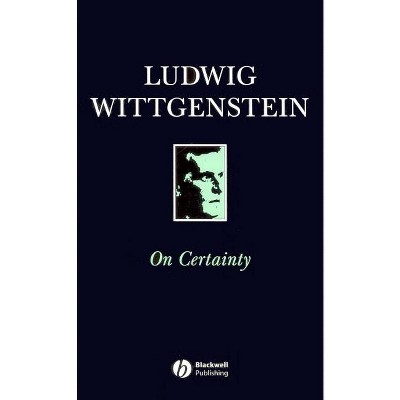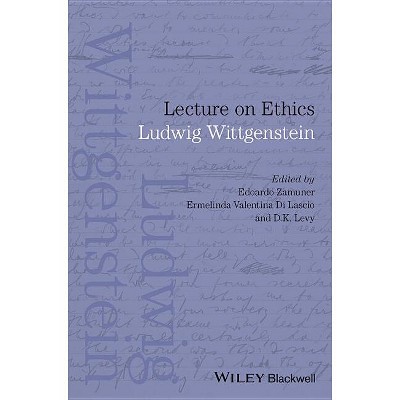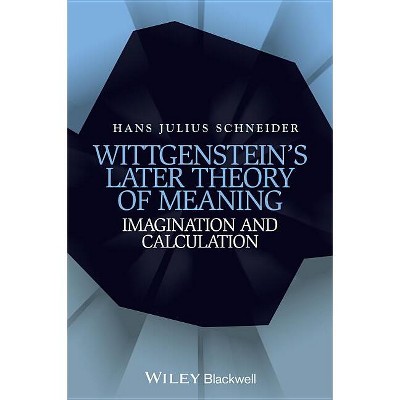About this item
Highlights
- Rush Rhees, a close friend of Wittgenstein and a major interpreter of his work, shows how Wittgenstein's On Certainty concerns logic, language, and reality - topics that occupied Wittgenstein since early in his career.
- About the Author: Rush Rhees (1905-89) was one of Wittgenstein's closest friends and his literary executor.
- 208 Pages
- Philosophy, Epistemology
Description
Book Synopsis
Rush Rhees, a close friend of Wittgenstein and a major interpreter of his work, shows how Wittgenstein's On Certainty concerns logic, language, and reality - topics that occupied Wittgenstein since early in his career.
- Authoritative interpretation of Wittgenstein's last great work, On Certainty, by one of his closest friends.
- Debunks misconceptions about Wittgenstein's On Certainty and shows that it is an essay on logic.
- Exposes the continuity in Wittgenstein's thought, and the radical character of his conclusions.
- Contains a substantial and illuminating afterword discussing current scholarship surrounding On Certainty, and its relationship to Rhees's work on this subject.
From the Back Cover
Even Wittgenstein's admirers have been puzzled by his last work, On Certainty. Some even regard it as a lapse at the end of a distinguished career, or as a late epistemological interest that remained undeveloped. Rush Rhees, a close friend of Wittgenstein and a major interpreter of his work, shows how Wittgenstein's On Certainty concerns logic, language and reality - topics that occupied Wittgenstein from early in his career.From his earliest work on the nature of propositions, to his interest in On Certainty with the 'sureness' in our language-games, Wittgenstein questions 'what it means to say something'. He emphasizes the importance not of that which cannot be questioned, but of what we do not question in our thought and action. In this book, Rhees brings out the continuity in Wittgenstein's thought, and the radical character of his conclusions.
In explicating this text, and demonstrating its continuity with Wittgenstein's earlier work, Rhees has done a great service that will be of profound interest to students and scholars of Wittgenstein for generations to come. Rhees's comments are introduced by D. Z. Phillips, who writes a substantial and illuminating afterword that discusses current scholarship surrounding On Certainty, and its relationship to Rhees's work on this subject.
Review Quotes
"This book contains illuminating remarks and a novel perspective on an important and widely discussed classic. And it has a special authority, being the work of one of the author's best students and closest friends." William Brenner, Old Dominion University, Norfolk, Virginia
"This book contains two remarkable and original contributions by Rush Rhees and D. Z. Phillips to the burgeoning scholarship on Wittgenstein's On Certainty. I recommend it strongly." Avrum Stroll, University of California, San Diego
About the Author
Rush Rhees (1905-89) was one of Wittgenstein's closest friends and his literary executor. He taught at Swansea from 1940 to 1966. Amongst Wittgenstein's posthumous works edited by Rhees are Remarks on the Foundations of Mathematics (1956), Blue and Brown Books (1958), Philosophical Remarks (1964), Lecture On Ethics (1965) and Philosophical Grammar (1969). Rhees is also the author of Discussions of Wittgenstein (1970, 1996) and Wittgenstein and the Possibility of Discourse (1998).D. Z. Phillips is Professor of Philosophy Emeritus and Rush Rhees Professor Emeritus at the University of Wales, Swansea, and Danworth Professor of the Philosophy of Religion at Claremont Graduate School, California. He has published widely in the philosophy of religion and ethics; some of his more recent books include Interventions in Ethics (1992), Wittgenstein and Religion (1993) and Religion and the Hermeneutics of Contemplation (2001). He is also editor of the Blackwell journal Philosophical Investigations.












